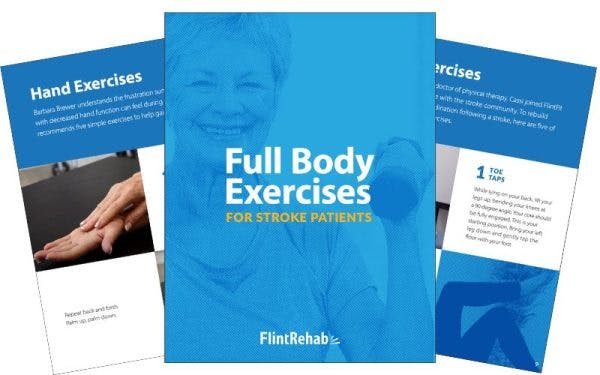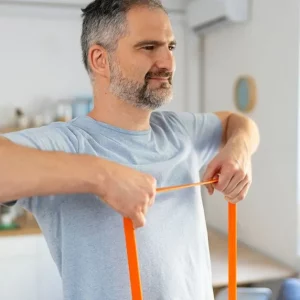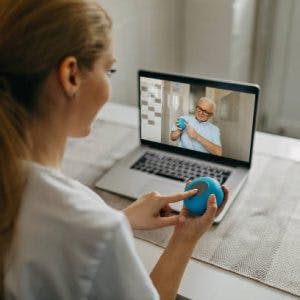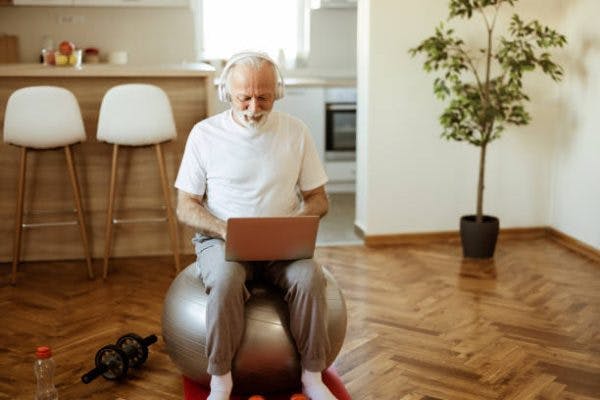Dizziness after stroke can occur for a wide variety of reasons, such as low blood sugar or a balance disorder. Balance disorders are more likely to occur when a stroke affects certain structures in the brain that contribute to balance, such as the cerebellum.
Due to the complex nature of dizziness after stroke, it’s important to work closely with your medical team to identify the cause of this symptom. This allows you and your rehab team to tailor a treatment plan to address post-stroke dizziness.
To help you have an informed conversation with your doctor, this article will discuss the causes and treatments for dizziness after stroke. You’ll also learn how vestibular therapy might be able to help (if the vestibular system is the culprit).
Use the links below to jump straight to any section:
- Causes of Dizziness After Stroke
- Symptoms of Dizziness (What It Feels Like)
- How Long Does Dizziness Last After Cerebellar Stroke?
- Using Vestibular Therapy to Reduce Dizziness After Stroke
- Vestibular Therapy Exercises to Help Improve Equilibrium
- Non-Vestibular Causes of Dizziness After Stroke
Causes of Dizziness After Stroke
Dizziness after a stroke looks and feels different for everyone. Some people can feel as though the entire room is spinning, while others might momentarily lose their sense of balance.
Dizziness has many different causes, and each requires a different specialized treatment. This is why a medical assessment is necessary in order to identify and address your specific symptoms. If left untreated, persistent dizziness after stroke can increase the risk of falls and further injury.
Potential causes of dizziness after stroke include:
- Migraines
- Dehydration
- Low blood pressure
- Low blood sugar
- Medications such as blood pressure or anti-seizure drugs
- Balance disorders caused by a stroke in an area of the brain that contribute to your sense of balance
- Vision changes
- Vestibular dysfunction
Cerebellar strokes in particular are known to result in balance disorders, which can cause sensations of dizziness and vertigo (more on this soon). However, strokes in other areas of the brain such as the occipital lobe or brain stem (which is connected to the cerebellum) can also cause dizziness.
When it Comes to Dizziness – Every Stroke is Different
Every stroke is different, and there are no hard lines to draw in regards to which area of the brain can cause dizziness if damaged. The best thing you can do is work with your medical team to determine the specific cause of your symptoms and the best course of treatment for you.
In addition to injury to the brain itself, dizziness after stroke can be related to other factors such as blood pressure, medications, and vision changes. For example, low blood pressure or side effects of new medications can cause feelings of lightheadedness. Similarly, changes in vision and depth perception after stroke can also cause a survivor to feel dizzy and off-balance.
Another important body system, called the vestibular system, can play a major role in balance and equilibrium. This system is located in the inner ear and communicates with the brain to relay information about balance and the body’s orientation in space. Vestibular dysfunction is more prevalent following a stroke that has affected the cerebellum or brainstem, but can also occur if a survivor has experienced a fall or trauma to the head.
Symptoms of Post-Stroke Dizziness: What It Feels Like
It’s important to describe dizziness in detail for your doctor as your specific symptoms can provide important insight. Dizziness often feels like lightheadedness, feeling faint or unsteady, or a loss of balance. You may also feel a spinning sensation, which is known as vertigo.
Environmental movement, such as being in a crowded store, can trigger or intensify dizziness after a stroke. Motion—like standing up, rolling over in bed, or riding in a car—can also cause symptoms to worsen.
Pay attention to the intensity and onset of your dizziness. If dizziness occurs with sudden intensity, seek emergency medical attention because this could be an uncommon sign of a stroke.
Also pay attention to your physical activity level and diet. Dehydration after a long day can cause you to feel dizzy. Dizziness may also occur if you recently started a new diet that is causing low blood sugar levels.
Ultimately, you are the expert on your body. Pay close attention to how you feel and what you are doing when dizziness after stroke occurs. As always, exercise diligence if intense dizziness comes on suddenly and seek emergency medical attention to be safe.
How Long Does Dizziness Last After Cerebellar Stroke?
As previously mentioned, a stroke in the cerebellum is often associated with post-stroke dizziness. The cerebellum is primarily responsible for voluntary muscle activation and coordination. This helps the body make important postural adjustments to maintain balance.
Through signals from the vestibular receptors and proprioceptors, the cerebellum commands motor neurons to compensate for shifts in body position, allowing the person to remain upright and steady. However, after a cerebellar stroke occurs, these signals can become disrupted. As a result, the patient can lose their sense of balance, which may contribute to sensations of dizziness.
Additionally, the cerebellum plays a role in vision and the coordination of eye movements. Disrupted visual tracking or depth perception can induce dizziness after a stroke and negatively impact balance.
Following a stroke, the brain will sometimes experience spontaneous recovery, meaning symptoms such as dizziness resolve on their own. Other times intentional rehabilitation is necessary to spark healing in the brain to reduce dizziness after stroke.
Since every stroke is different, every recovery timeline will be different. This means it’s impossible to predict how long dizziness will last for any particular person.
However, just because recovery time is hard to predict does not mean you have to feel powerless. Proactively seek help from your medical team and follow through on any therapeutic exercises they provide. This will help maximize your chances of recovery.
How to Reduce Dizziness After a Stroke with Vestibular Therapy
There are several effective ways to help restore your sense of balance and reduce symptoms of dizziness after stroke, including vestibular therapy. Vestibular therapy actively engages the body’s vestibular system, which plays a key role in maintaining balance.
As this article touched on earlier, the vestibular system is an elaborate sensory system that provides the brain with information about motion, head position, and spatial orientation. If the vestibular system is not functioning properly, individuals may experience sensations of dizziness, eye movement problems, and a false sense of motion.
By engaging the brain’s natural healing process, called neuroplasticity, vestibular therapy can help repair the vestibular system and therefore reduce dizziness after stroke. Neuroplasticity is how the brain creates and strengthens neural pathways. After a stroke has disrupted some of the highways that communicate your body’s sense of balance, neuroplasticity allows you to rebuild these paths.
With hard work, survivors can often regain their abilities — including sense of balance — through therapy and rehabilitation.
Vestibular Therapy Exercises to Improve Equilibrium
Practicing vestibular therapy exercises can provide the brain with the stimulation it needs to rewire itself and recover from a balance disorder. Keep in mind that engaging neuroplasticity and creating new pathways to strengthen balance skills and reduce dizziness after stroke requires consistency and repetition.
Consistent experience with vestibular therapy helps create and strengthen new neural pathways in an efficient manner. This provides the most benefits for reducing dizziness after stroke and will allow you to progress more quickly during your recovery journey.
Working with a physical therapist who specializes in vestibular rehabilitation is a valuable and necessary tool to help you recover from dizziness after stroke. These trained experts can help pinpoint your specific vestibular dysfunction and provide you with treatments and exercises to address this directly.
Vestibular Therapy – Primary Exercises
For example, therapists often include these three primary exercise interventions in a vestibular therapy program.
- Gaze stabilization exercises. The vestibular system plays an important role in our vision, and gaze stabilization exercises help restore the vestibulo-ocular reflex (a reflex that, when impaired, can cause disorientation and vertigo).
- Habituation exercises. These exercises help reduce dizziness by exposing the person to the movement that bothers them, such as bending over to pick something up off the ground. The goal is to increase tolerance so that those movements no longer affect your balance.
- Balance and exertional training. As your dizziness improves, you can progress to practicing more advanced balance exercises and cardio to increase your stability and endurance. The goal of exertional training is to eventually build up the person’s stamina to the level it was before their stroke, or as close as possible.
Consistency and repetition are key ingredients for rewiring the brain. Therefore, to get the most benefit, ask your therapist to send you home with exercises to practice on your own, too.
Non-Vestibular Causes of Dizziness After Stroke
In addition to vestibular dysfunction, dizziness after stroke can be tied into other secondary effects or lifestyle changes. For example, over 50% of survivors experience dysphagia, or swallowing difficulties, after stroke. This could lead to dehydration or malnutrition, increasing lightheadedness or dizziness.
Additionally, doctors often prescribe new medications to stroke survivors to reduce the risk of another stroke and control bodily functions such as blood pressure.
However, medications can sometimes be accompanied by negative side effects, such as dizziness or low blood pressure.
It is important to communicate with your doctor about any side effects you are experiencing so they can adjust your medications if needed. Furthermore, let your doctor know if you are experiencing any visual symptoms as they may need to refer you to a vision specialist.
Overcoming Dizziness After Stroke
Dizziness after stroke could have a wide variety of causes, from unwanted medication side effects to disruption of the vestibular system. Since dizziness after stroke can be complex, it’s important to work closely with your medical team to diagnose the cause of your symptoms. Together you can plan an appropriate course of action, which may involve vestibular therapy.
Remember that sudden onset of dizziness could indicate another stroke, so always proceed with extreme caution and seek emergency medical attention when necessary. We hope this article has helped explain methods to reduce dizziness after stroke and motivate you to work closely with your medical team to find the best treatment for you.










